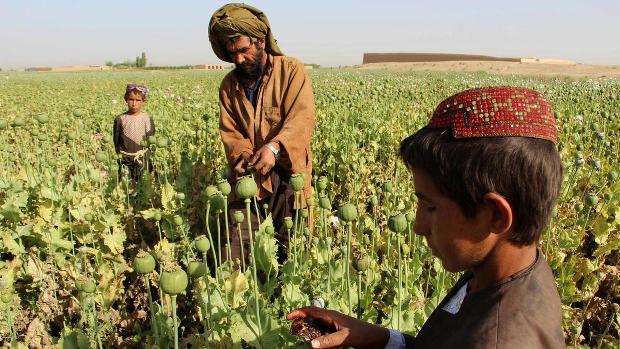Afghan children and unemployed turn to opium for quick cash
NEW DELHI -Taliban, coronavirus, crippling economy, floods, rising unemployment and limited resources: Afghanistan has been one of the worst-hit countries this year.
As the pandemic and the floods hit the country, locals lost their paid and season jobs, and had to turn to the next best solution. Sadly, the next best solution for majority locals was heading towards the poppy fields.
Afghanistan is one of the highest producers of opium as it produces nearly 80% of the global supply and also provides thousands of jobs.
When coronavirus hit the country, lots of locals lost their jobs to the pandemic. So, majority of them turned towards the poppy fields to provide for their families.
“Because of the coronavirus I lost my job. I have a family of 12 members, I am the breadwinner,” said Fazily, 42, a mechanic in the central province of Uruzgan who, like many Afghans, goes by one name.
“I have no other way but to work in poppy fields to make some money.”
The poppy fields are usually taken care of by seasonal labourers in spring and summer. However, the pandemic scared a lot of them and the labourers were hesitant to participate this season. This caused a shortage of workers too, especially as the borders with Pakistan, too, are now closed.
The lack of seasonal labourers and lack of jobs helped the farmers and the unemployed meet each other halfway.
Sadly, it is not just the unemployed labourers laid off from work who are attending to the crops. Students, too, have started working at the field to earn some quick cash in their unexpected free time.
Since the pandemic began, schools in Afghanistan have been closed to contain the spread of the novel coronavirus. This has led to children going out with their parents to earn extra money, instead of opting for home-schooling — which is a vague concept in the country.
“Our school is closed and I have enough time to go work in a poppy field and make some money,” said Nazir Ahmad, an 18-year-old student in Kandahar.
“About 20 of my classmates are also working here.”
While it has been portrayed that poppy cultivation is not encouraged and is, in some ways, illegal — especially when children are involved — the poppy cultivation has increased this year due to the lockdown. The reality underneath is that Taliban, and to some extent the local government, do encourage poppy cultivation as the Taliban profits from taxing farmers and traffickers, and running its own drug-making factories that turn raw opium into morphine or heroin for export, with drugs then trafficked through neighbouring Pakistan and Iran.
With the economy slowly reopening, there is still some hope for children to head back to schools. However, till now more than 38,000 cases of coronavirus have been declared in Afghanistan and more than 1,400 deaths, and the government believes that a third of the population has likely contracted the disease.
-wionews.com


